Parking transaction data from over 400 cities indicates that people are getting back on the roads
ParkMobile, the leading provider of smart parking and mobility solutions, revealed new data today that shows increasing parking transactions in cities across the U.S. In early to mid-March, as fears of COVID-19 spread and more cases were diagnosed, cities and states shut down and people stayed at home. This caused a significant drop in the number of daily parking transactions in cities. The ParkMobile app is available in over 400 cities in the U.S., so the company’s data presents a clear view of the impact of the pandemic on consumer mobility.
Chart #1 below shows the severe drop in parking transactions as COVID-19 cases increased in March and states started to shut down. Compared to the previous month, parking transactions were down almost 95% across the country. This indicates that most non-essential workers were following the stay at home orders to help prevent spread of the virus.
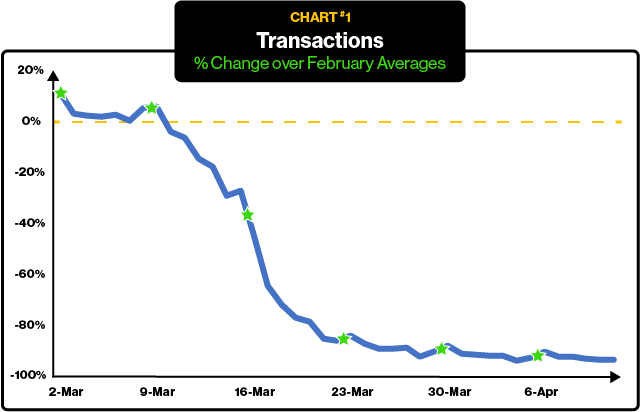
In recent weeks, ParkMobile data reveals that activity is starting to gradually pick up. Cities and states are lifting some restrictions and parking transaction volume is slowly increasing on a week-to-week basis. This is a clear sign that people are going out more often. In Chart #2 below, you can see the week-over-week growth in parking volumes. It is still not clear from the data if and when things will get back to pre-COVID–19 levels.
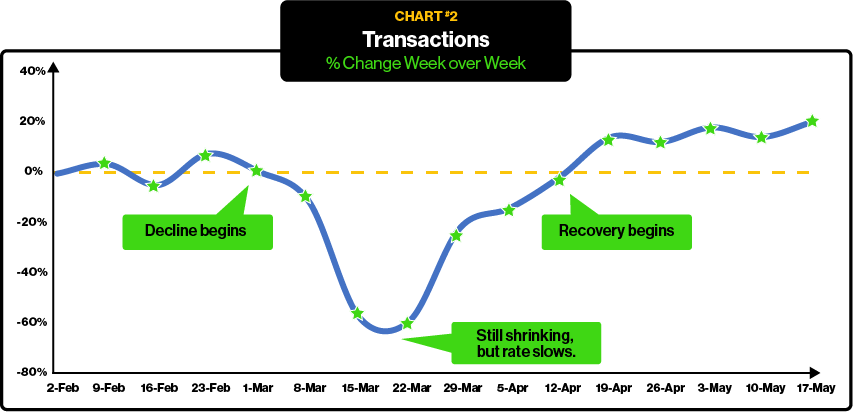
The top 10 cities in the U.S. saw a slower rate of decline in early-to-mid March than smaller cities overall. Chart #3 below shows that the big cities hit their bottom about a week after the smaller markets. The rate of recovery for big cities has also been flatter than smaller cities because they did not initially decline as much.
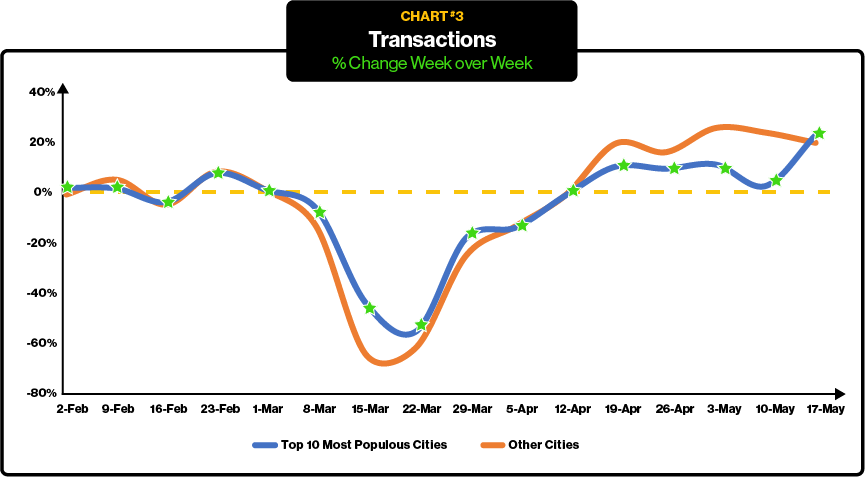
Beach communities are seeing the biggest increase in parking volume as people are looking for activities where they can be outdoors while social distancing. Chart #4 below shows that parking transactions in beach communities are outpacing those in cities. As summer approaches and the weather gets warmer, beach parking transactions should continue to increase. ParkMobile recently introduced service to the Borough of Belmar at the Jersey Shore. According to Belmar Mayor Mark Walsifer, “The Borough of Belmar wants to ensure the safety of visitors and residents. By partnering with ParkMobile to offer contactless parking payments, we are working to provide our community with a smart mobility option for anyone looking to spend time at the beach.”
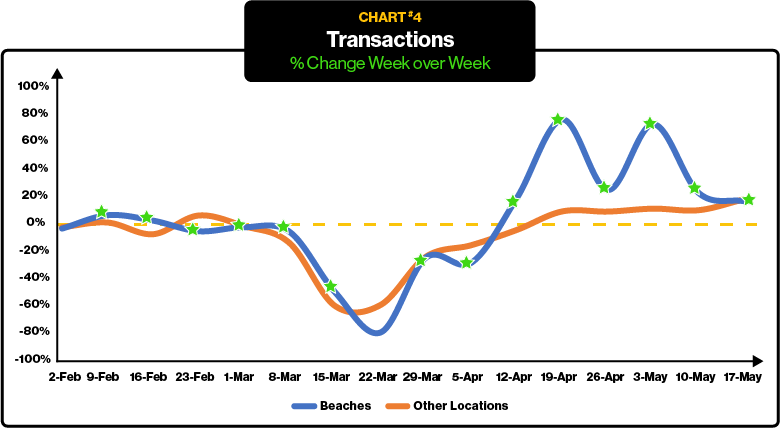
While parking volumes are picking up across the country, the way people are paying for parking is also changing. Cities are actively promoting contactless payments through apps like ParkMobile in an effort to stop people from touching the meters. Many cities are reporting that utilization of the app versus the meter has shifted heavily towards the app over the past three months. One large city reported that utilization of the app versus the meter jumped from 60% up to 80%.
In a recent move, New York City Department of Transportation launched the ParkMobile app in addition to the current ParkNYC app, also powered by ParkMobile, to give people more mobile payment options in the city. According to a recent statement from NYC DOT Commissioner Polly Trottenberg, “DOT is asking all New Yorkers who can to switch to Pay-By-Cell, which will reduce the need for physical cash transactions at our 14,000 parking meters. Contactless Pay-By-Cell reduces exposure risk for the public and our workforce. Please help us reduce the need to physically service parking meters and collect, sanitize, and securely store cash during this crisis.”
“It’s very clear that one of the lasting impacts of COVID-19 will be that people want more contactless payment options,” says Jon Ziglar, CEO of ParkMobile. “We’re proud that we can partner with cities to promote use of the app in order to keep people safe and protect city workers.”
ParkMobile continues to encourage people to do everything they can to prevent the spread of the virus including wearing masks, washing hands, and social distancing. The company’s headquarters in Atlanta, GA, has been closed since March 12th, and all 200 employees have been working from home since that time. The company hopes to reopen in the near future but will only do so when it is safe for employees to return.
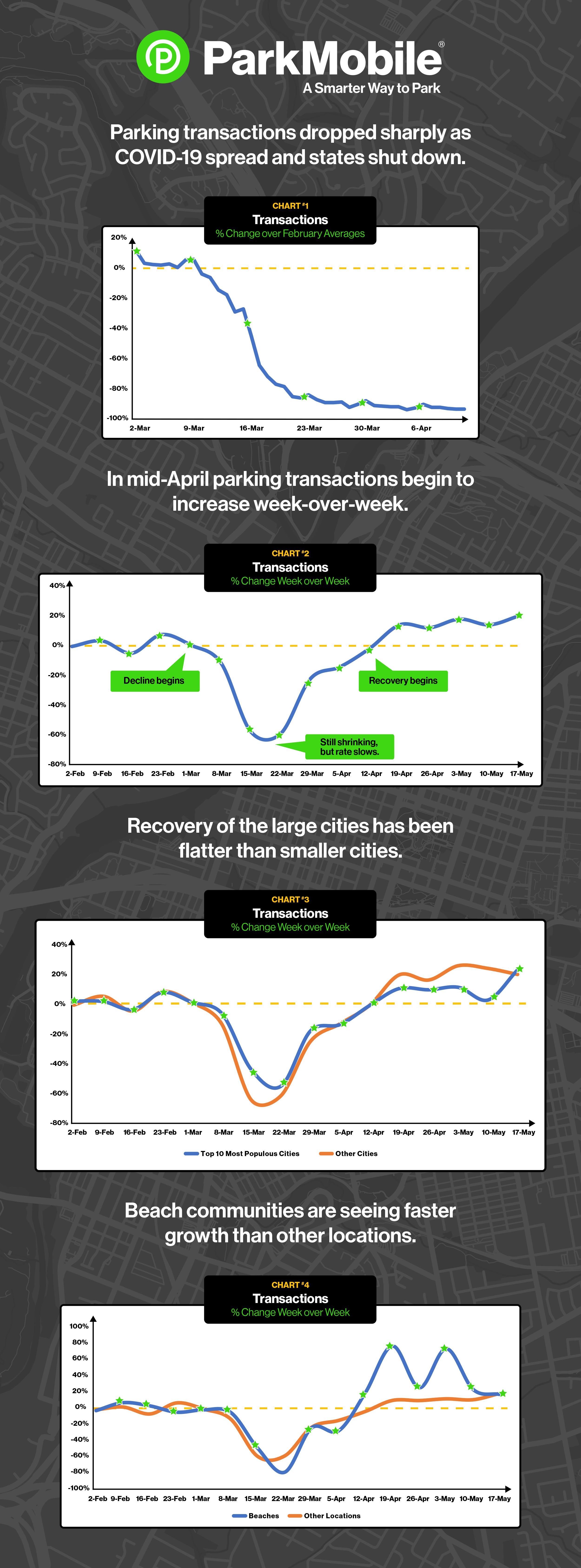

 Get it on Google Play
Get it on Google Play